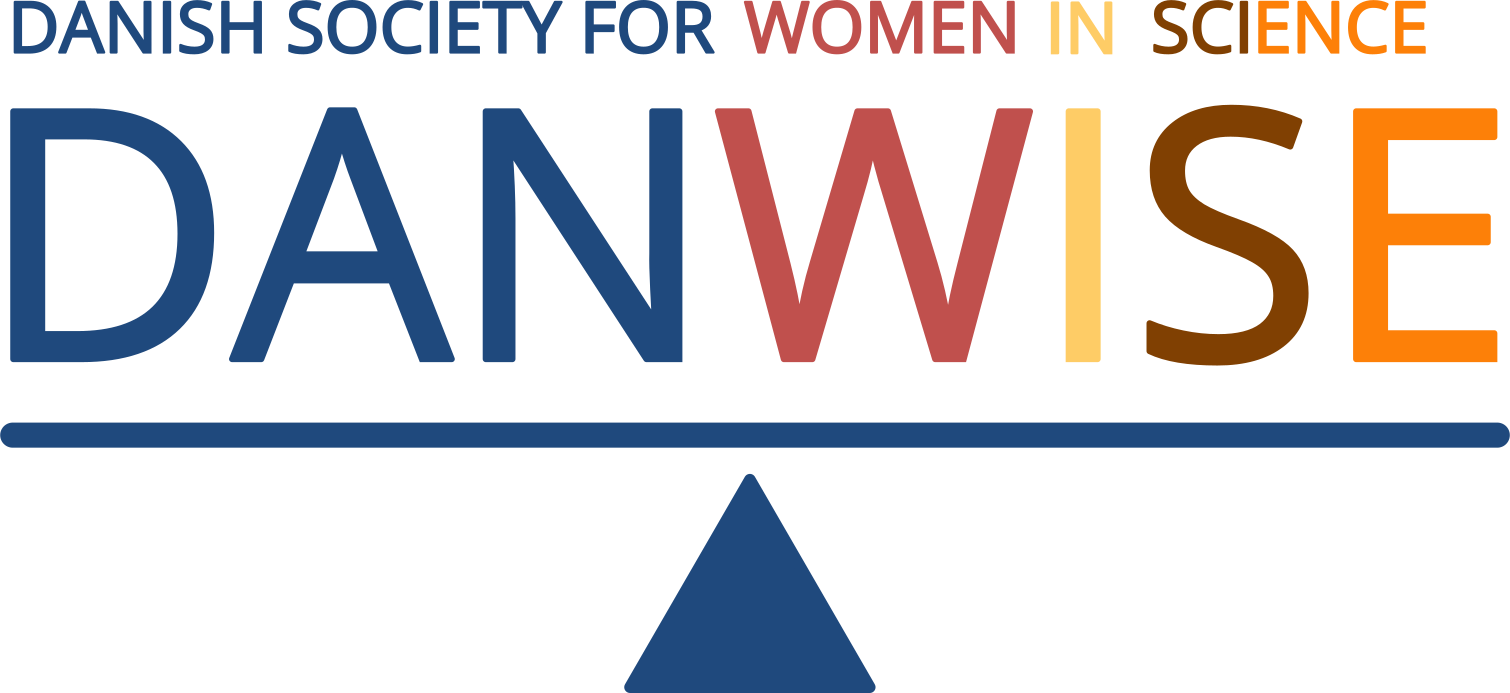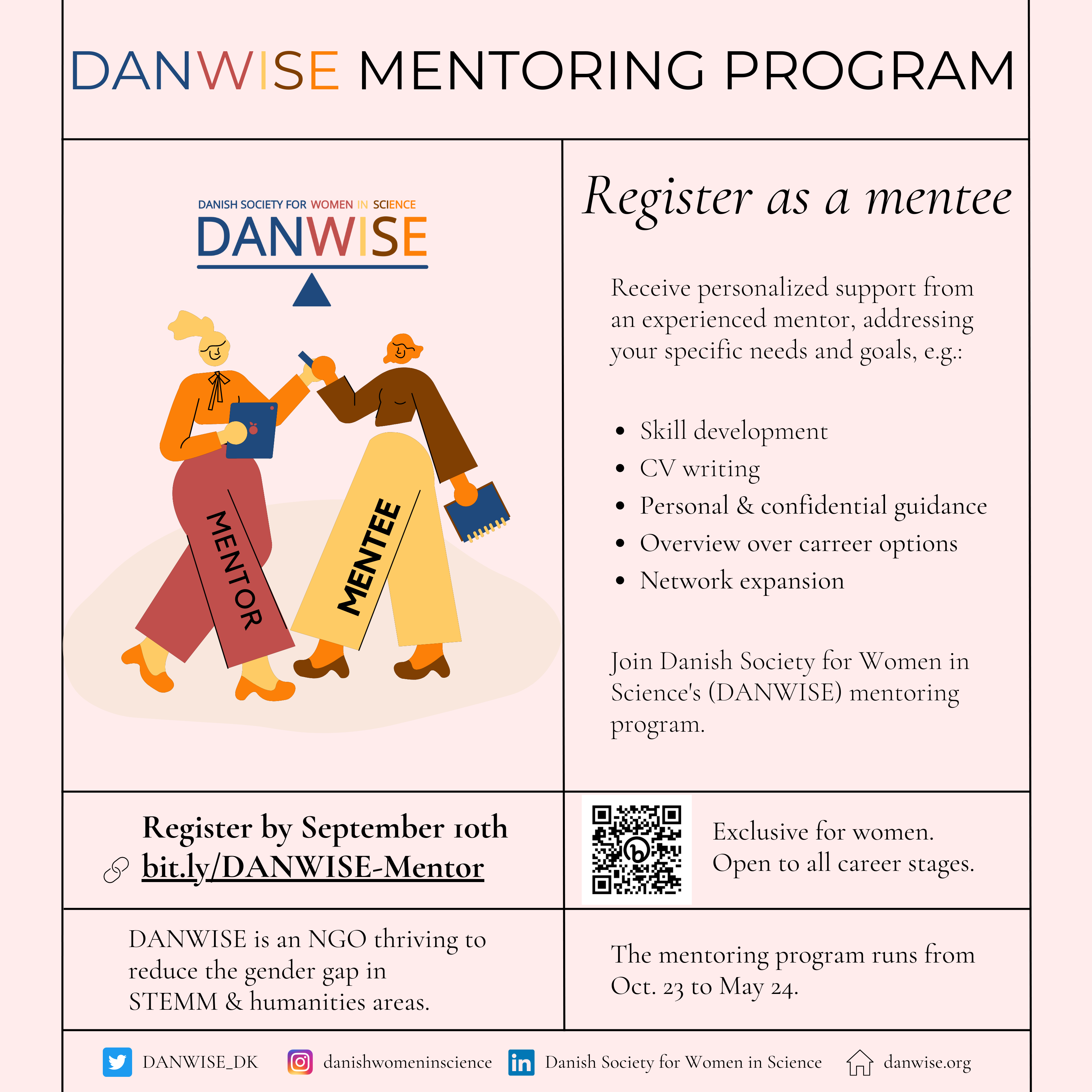MENTORING PROGRAM 2023/2024
The registration for mentees closed on the 10th of September, but you may sign up to the waiting list.
The registration of mentors closed on the 13th of August, but you may sign up to the waiting list.
The goal of the DANWISE Mentoring Program is to facilitate the guidance and support of young female scientists through mentoring by experienced and independent role models across academia and industry. The program was launched in 2019, the first year of DANWISE’s existence, where 6 mentees were paired with mentors. Since then, the program has been running once a year and has grown to include 40 mentee-mentor pairs in the latest round (2022/23).
THE MENTOR-MENTEE PAIRING PROCESS
Mentors and mentees register through a sign-up form on our website during June-September. The number of mentee spots is limited by the number of available mentors. Mentor-Mentee pairs are formed in September by the DANWISE Mentoring Team based on information gathered through the sign-up form.
The program begins with an online Kick-Off Meeting which this year will take place in the afternoon on Friday October 27th 2023. This will be an online meeting where mentors and mentees get a chance to meet for the first time, and we will have a couple of inspirational speakers talk about their experience with mentoring and how to build a fruitful mentor-mentee relation.
A good match between the mentee and mentor is essential and constitutes the foundation of a fruitful mentoring relation. Therefore, we highly encourage both the mentees and mentors to reflect upon their personal aims and expectations before entering a mentoring relation and to provide us with specific information about this when signing up.
Alignment of Expectiations
Once a mentor and mentee has agreed to initiate a mentoring relation, decide on a time and place (physical or virtual) to have your first meeting.
We encourage you to start out the first meeting by together filling out the Mentor-Mentee Agreement Form in order to align expectations and agree on a structure for your meetings.
The mentee should define what concrete challenges the mentoring meetings should deal with. These challenges should be related to the mentee’s professional life such as career planning, skills, work-life balance, CV etc.
The questions below might be helpful to clarify and align expectations:
- What does the mentee want to achieve?
- What kind of help does the mentee hope to receive?
- What kind of help does the mentor anticipate providing?
- How will you evaluate the meetings during the process?
- How is confidentiality ensured?
- How should cancellations or changes be handled?
Meeting Frequency and Structure
- The mentor and mentee together define the frequency and duration of the meetings
- The suitable meeting structure and frequency will depend on individual needs, but as a guideline we suggest meeting for 1-1.5 hours every 4-6 weeks
- You may find a need to adjust the meeting frequency during the program as there is typically a need for more frequent meetings in the beginning
The good mentoring meeting
- The mentee is responsible for calling for the meetings and defining the agenda
- An agenda may look like this:
- What has happened since the last meeting?
- Agreeing on the purpose of the meeting
- Exploring topics from the perspective of the mentee
- Drawing up options for taking action
- Summing up the meeting and defining the mentee’s focus until the next meeting
- Setting the date for the next meeting
- It is the mentor’s responsibility to keep the mentee on track and regularly make sure that expectations are still aligned
- The mentor should avoid giving the mentee instructions (“You have to do this and this”), but rather provide advice (“If I were you, I would do this and this”) and guidance (“Have you tried doing this and this?”) and ask questions to help the mentee reflect upon her own situation (“What have you considered doing?”)
Logbook
- It can be a very good idea for both the mentee and the mentor to write down learning points, ideas, realizations, thoughts etc. in a logbook
- Short notes from each meeting will help the mentor discover whether the mentee progresses or whether there are areas that still have not been fully addressed
- A logbook helps the mentee retain thoughts and learning points, and when used systematically it will allow the mentee to monitor her personal development
If you have any questions or experience any issues during the mentoring program, please feel free to reach out to DANWISE for support any time at info@danwise.org.

